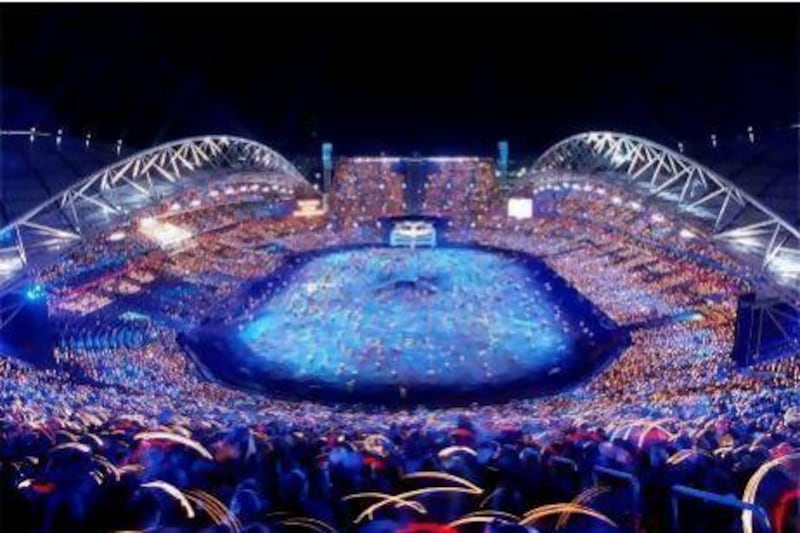SYDNEY // They were, according to the late Juan Antonio Samaranch, then president of the International Olympic Committee, the "best Olympic Games ever".
But 12 years after Sydney bathed in the global spotlight, the legacy of the 2000 Games is mixed.
The stadium where the Aboriginal sprinter Cathy Freeman won her 400-metre gold medal, fulfilling a personal dream and a nation's hopes, has finally become well used.
The Olympic precinct, built on former industrial wasteland in Sydney's western suburbs, has attracted a series of high-profile sporting events, and increasing numbers of businesses and residents.
Australians who helped to stage the Games have found themselves in great demand, exporting their expertise to Athens, Beijing and now London.
Sydneysiders still feel a warm glow when they remember 2000, and the excitement of hosting the first Olympics of the new millennium.
But in other ways the post-Games period has been disappointing. Far from soaring as a result of Sydney's exposure to the world, tourism has declined since 2000.
And hopes that seeing elite athletes perform would encourage wider participation in sport have been dashed. One study suggests it only inspired Australians to watch more sport on TV.
Some locals still grumble about Sydney Olympic Park. Although right in the middle of the city's most densely populated suburbs, it is far from the harbourside and inner-city neighbourhoods inhabited by the well-heeled.
"I always thought Sydney put its Olympics in the wrong place," says Elizabeth Farrelly, an author and columnist with a doctorate in architecture.
"It would have been a better Olympics and a better legacy if we'd built it in the city centre. But there happened to be spare land at Homebush Bay, so it was mainly about expediency."
Public transport in the area remains so poor that people moving into new residential developments are forced to rely on cars, Ms Farrelly says.
"The place still feels like it's miles from anywhere."
Criticism was sharpest in the first few years after the Games, when the under-used sports facilities cost taxpayers millions of dollars to maintain and the Olympic precinct, with its wide, empty avenues, felt like a ghost town.
"There were post-Games plans but they were not fully formulated, so the sporting and commercial legacies were slow to take off," says Richard Cashman, an Olympics academic and author based at the University of Technology in Sydney.
The tide began to turn after the stadium hosted the Rugby World Cup final in 2003. Since then, it has been used for international rugby league, football and cricket, and concerts by, among others, the Rolling Stones.
Other venues are also popular. The former Superdome, where Olympic basketball and gymnastics were staged, is the world's second most profitable indoor venue after London's O2 Arena, says Alan Marsh, the chief executive of the Sydney Olympic Park Authority.
Twelve million people passed through the precinct last year and 6,000 events were held there.
Those statistics "would seem to be a significant measure of success", says Mr Marsh.
The park has also become home to more than 100 banks, businesses and other organisations. The first of several apartment blocks opened this year, reinforcing the sense that the area is becoming a new suburb.
The surrounding greenery - which is Australia's largest urban parkland, consisting of wetlands, woodlands and remediated land - is full of Sydneysiders picnicking and cycling at weekends.
Venues outside the park, such as the velodrome and rowing centre, continue to be a drain on the public purse.
Meanwhile, tourism operators remain bitter that Australia failed to capitalise on the publicity generated by the Games.
Bad luck partly explains the drop in visitor numbers. The terrorist attacks of 2001 and the Sars epidemic came soon after the event.
But some operators blame complacency and a lack of investment in tourism promotion and infrastructure.
Speaking on the 10th anniversary of the Games, the former head of the main tourism industry forum, Chris Brown, observed that Sydney was "renowned for running a great gig but squandering an opportunity".
After Sydney 2000, New South Wales taxpayers were left with a bill of A$1.3 billion (Dh4.97 billion at today's rates), which was paid off by 2001.
But some things cannot be measured in money. As John Coates, president of the Australian Olympic Committee, has observed, the nation "derived a sense of self-confidence from the Games … the world took notice of Australia".
Mr Cashman agrees some legacies are intangible.
"People in Sydney still remember with a great deal of fondness and nostalgia that fantastic feeling of being part of the Games," he says.
"There was a great party atmosphere and it was a time when everyone felt very alive."





